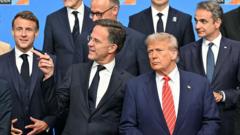What Are the Key Takeaways from NATO's Summit on Boosting Defense Spending?

Understanding the Historic NATO Summit in The Hague: Key Takeaways and Implications
The NATO summit held in The Hague marked a pivotal moment in the alliance's history, representing not only the largest security operation ever conducted in the Netherlands but also a significant turning point for NATO's 32 member states. Amidst serious discussions about defense spending and the ongoing threat posed by Russia, there were unexpected moments of humor that lightened the atmosphere. This article delves into the major outcomes of the summit, the implications for member states, and what it means for the future of NATO in a rapidly changing geopolitical landscape.
The Commitment to Increased Defense Spending
One of the most significant outcomes of the summit was the renewed commitment to a 5% defense spending target, to be achieved over the next decade. This decision reflects a remarkable increase from the current guideline of 2%, which is not even met by a third of NATO members. The new spending target is broken down as follows:
- 3.5% Core Defense Spending: This portion must be allocated to core defense expenditures, including personnel, weapons, and equipment.
- 1.5% Defense-Related Expenditure: This more flexible category allows for spending that indirectly supports defense, including investments in critical infrastructure, cybersecurity, and civil preparedness.
The challenge for many NATO countries will be meeting the 3.5% core defense spending target, especially as many nations currently hover around the 2% mark. To ensure accountability, member states will be required to submit annual plans outlining how they intend to reach the 5% target, which will be reviewed in 2029.
Reaffirming the Principle of Collective Defense
Article Five of NATO's founding treaty, which states that an attack on one member is an attack on all, remains a cornerstone of the alliance. During the summit, the reaffirmation of this principle was crucial, especially in light of prior comments made by former U.S. President Donald Trump regarding the importance of member states "paying their way." Despite his previous ambiguities, Trump emphasized his commitment to collective defense, asserting, "I stand with Article Five, that's why I'm here."
This reassurance was particularly welcomed by NATO members that feel most threatened by Russia. Trump's return to Washington with a deal that commits all NATO members to increasing their military spending reflects a unification of purpose among the alliance, despite the unpredictable nature of his leadership.
The Russia Dilemma: A Balancing Act
The threat posed by Russia loomed large over the summit discussions. Many NATO countries, especially those bordering Russia, perceive an imminent danger from Moscow's military ambitions. Dutch Prime Minister Mark Rutte has been vocal in suggesting that Russia could resort to military action against the alliance within five years. However, the summit's final declaration carefully navigated this sensitive issue.
While it acknowledged the "long-term threat posed by Russia to Euro-Atlantic security," there was a noticeable absence of direct condemnation of Russia for its actions in Ukraine. This lack of a definitive stance may reflect Trump's softer approach towards Moscow, which has often clashed with the more hardline views of European leaders. The summit's communique reiterated support for Ukraine but stopped short of explicitly labeling Russia as the aggressor, a point that may leave some member states feeling uneasy.
Domestic Political Challenges and International Relations
Amidst the summit's serious discussions, individual leaders faced their own domestic political challenges. For instance, Spain’s Prime Minister Pedro Sánchez arrived in The Hague dealing with political scandals back home. Spain ranks at the bottom of NATO's defense spending league, contributing only 1.24% of its GDP to defense. In light of the summit's new spending commitments, Sánchez insisted that 2.1% was sufficient and in line with Spain's social model.
Trump's response to Sánchez highlighted the tensions within the alliance, as he criticized Spain for not meeting its spending obligations and hinted at potential trade repercussions. This dynamic underscores the complexities of maintaining unity among NATO members, particularly when individual countries grapple with domestic issues that may conflict with collective goals.
The Role of Leadership and Diplomacy
NATO Secretary General Mark Rutte found himself at the center of some unexpected diplomatic exchanges during the summit. He engaged in a light-hearted yet revealing conversation with Trump, referring to him as "daddy," which garnered much media attention. Rutte's attempt to flatter Trump by praising his foreign policy decisions demonstrates the delicate balancing act NATO leaders must perform—navigating personal relationships while addressing serious security concerns.
Rutte's comments, while seemingly humorous, reflect a broader strategy of maintaining rapport with the U.S. administration, which is essential for European leaders who need to present a united front against threats from Russia and elsewhere.
The Future of NATO: Challenges and Opportunities
The decisions made during the summit will have profound implications for NATO's future. The commitment to increased defense spending represents a significant shift in the alliance's approach to collective security. As member states work towards the ambitious 5% target, they will need to carefully consider how to allocate resources effectively to meet both current and emerging threats.
Moreover, the necessity for unity among member states has never been more critical. As geopolitical tensions escalate, the question remains: can NATO maintain cohesion in the face of differing national interests and political pressures? The alliance must navigate these challenges while continuing to support its foundational principles of collective defense and deterrence.
Conclusion: A New Era for NATO
The Hague summit has ushered in a new era for NATO, characterized by heightened defense commitments and a reaffirmation of collective security. While the challenges ahead are significant, the decisions made during these two days signify an important step towards ensuring the alliance's resilience in an uncertain world. As NATO countries strive to adapt to the evolving security landscape, the outcomes of this summit will undoubtedly shape the future of transatlantic relations.
FAQs
What was the main outcome of the NATO summit in The Hague?
The main outcome of the NATO summit was the commitment to a 5% defense spending target within a decade, a significant increase from the current 2% guideline.
Why is NATO's Article Five important?
Article Five is crucial as it establishes the principle of collective defense, meaning that an attack against one member is considered an attack against all, thereby reinforcing mutual security among member states.
How does the summit address the threat posed by Russia?
The summit acknowledged the long-term threat posed by Russia but refrained from explicitly condemning its actions in Ukraine, reflecting a cautious approach to balancing relations with Moscow.
What challenges do NATO member states face in increasing defense spending?
Many member states currently hover around the 2% spending threshold, making it a significant challenge to reach the new 3.5% core defense spending target while balancing domestic political pressures and social programs.
What role does leadership play in NATO's decision-making process?
Leadership is vital in NATO's decision-making, as individual leaders must navigate complex domestic and international issues while maintaining unity and cooperation among member states.
As NATO embarks on this ambitious journey, how will member states balance their national interests with the collective goals of the alliance? Will they be able to adapt to the changing geopolitical landscape effectively? #NATO #DefenseSpending #CollectiveSecurity
Published: 2025-06-25 18:08:04 | Category: technology



